Corporate Social Responsibility: Analysis and Evaluation
VerifiedAdded on 2020/04/07
|10
|2242
|392
Essay
AI Summary
This essay examines Corporate Social Responsibility (CSR), defining it as a corporation's ethical framework and duties towards stakeholders. It explores the increasing importance of CSR, particularly for multinational corporations operating globally, emphasizing the need for ethical regulations. The essay evaluates the advantages and disadvantages of CSR strategies, highlighting their impact on recruitment, retention, market reputation, investor attraction, and sales. It also addresses the drawbacks, such as the shift from revenue-based to welfare-based objectives, increased expenditures, and the complexities of regular disclosures. Furthermore, the essay discusses the need for strict guidelines to enforce CSR policies and prevent abuses, while acknowledging the overall positive impact of CSR on society and the environment. The essay concludes by emphasizing the need for greater awareness of CSR benefits among small and medium enterprises and the government's role in enforcing CSR policies.
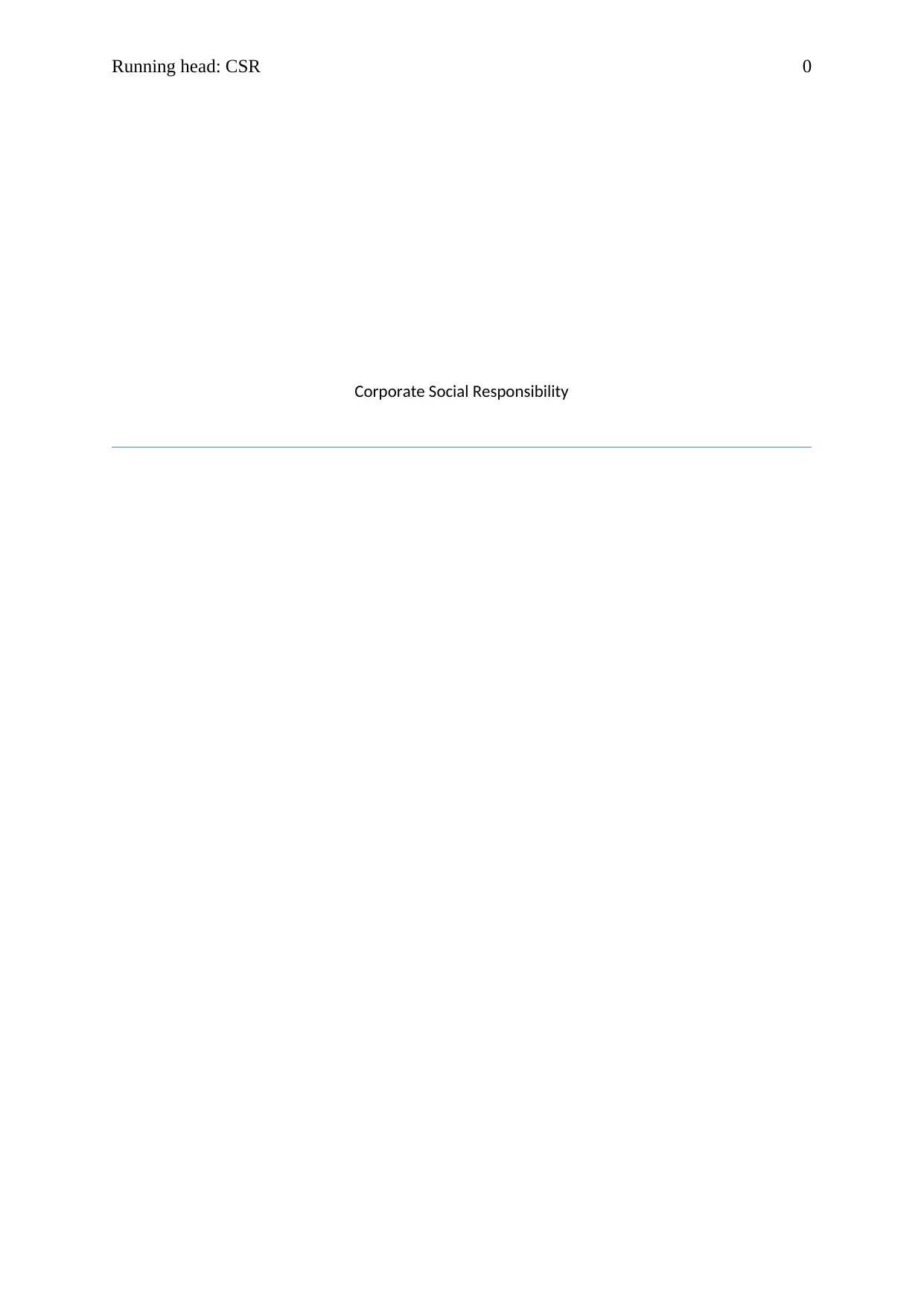
Running head: CSR 0
Corporate Social Responsibility
Corporate Social Responsibility
Paraphrase This Document
Need a fresh take? Get an instant paraphrase of this document with our AI Paraphraser

CSR 1
Contents
Introduction................................................................................................................................2
Analysis of Corporate Social Responsibility.............................................................................3
Conclusion..................................................................................................................................7
References..................................................................................................................................8
Contents
Introduction................................................................................................................................2
Analysis of Corporate Social Responsibility.............................................................................3
Conclusion..................................................................................................................................7
References..................................................................................................................................8
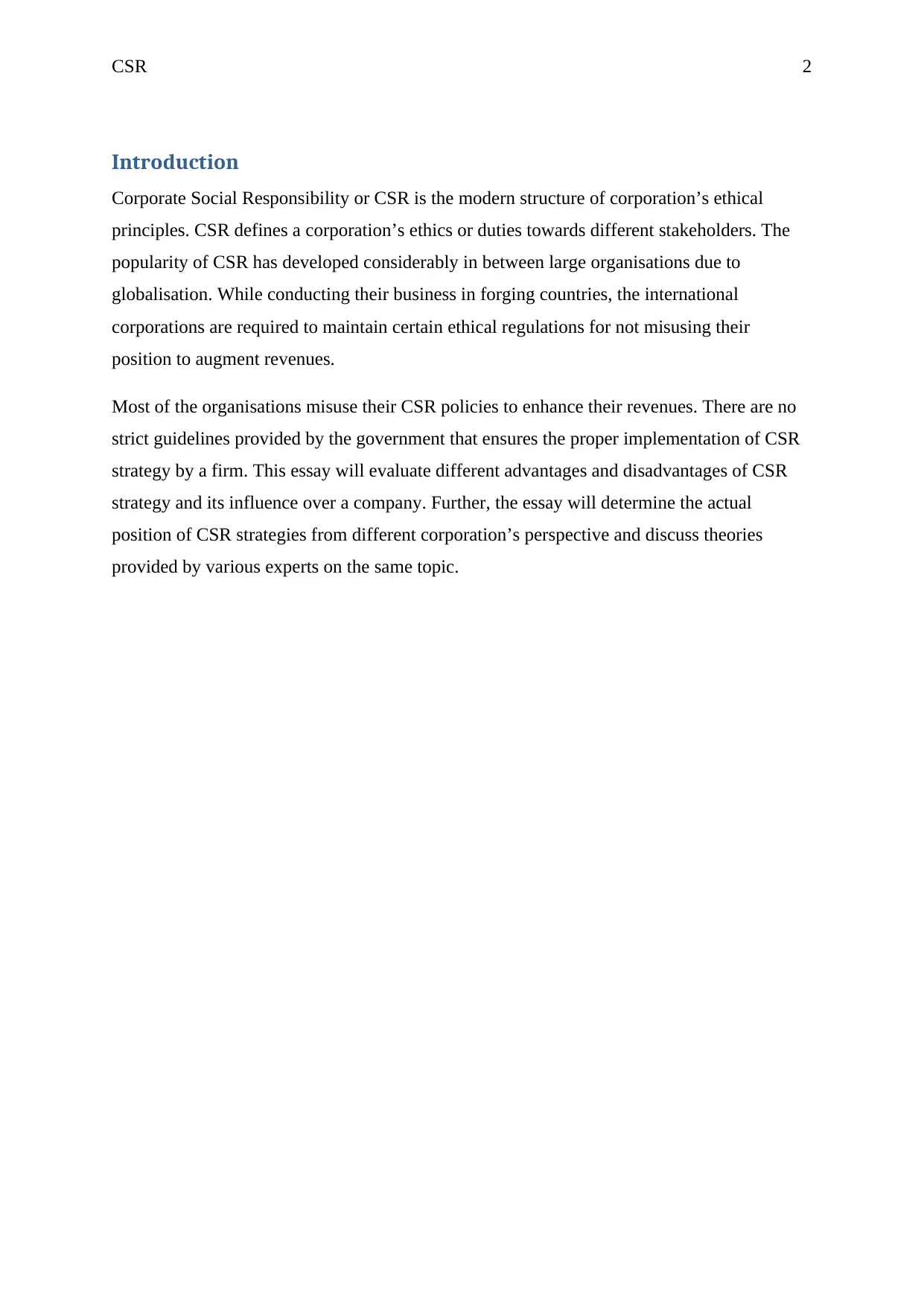
CSR 2
Introduction
Corporate Social Responsibility or CSR is the modern structure of corporation’s ethical
principles. CSR defines a corporation’s ethics or duties towards different stakeholders. The
popularity of CSR has developed considerably in between large organisations due to
globalisation. While conducting their business in forging countries, the international
corporations are required to maintain certain ethical regulations for not misusing their
position to augment revenues.
Most of the organisations misuse their CSR policies to enhance their revenues. There are no
strict guidelines provided by the government that ensures the proper implementation of CSR
strategy by a firm. This essay will evaluate different advantages and disadvantages of CSR
strategy and its influence over a company. Further, the essay will determine the actual
position of CSR strategies from different corporation’s perspective and discuss theories
provided by various experts on the same topic.
Introduction
Corporate Social Responsibility or CSR is the modern structure of corporation’s ethical
principles. CSR defines a corporation’s ethics or duties towards different stakeholders. The
popularity of CSR has developed considerably in between large organisations due to
globalisation. While conducting their business in forging countries, the international
corporations are required to maintain certain ethical regulations for not misusing their
position to augment revenues.
Most of the organisations misuse their CSR policies to enhance their revenues. There are no
strict guidelines provided by the government that ensures the proper implementation of CSR
strategy by a firm. This essay will evaluate different advantages and disadvantages of CSR
strategy and its influence over a company. Further, the essay will determine the actual
position of CSR strategies from different corporation’s perspective and discuss theories
provided by various experts on the same topic.
⊘ This is a preview!⊘
Do you want full access?
Subscribe today to unlock all pages.

Trusted by 1+ million students worldwide
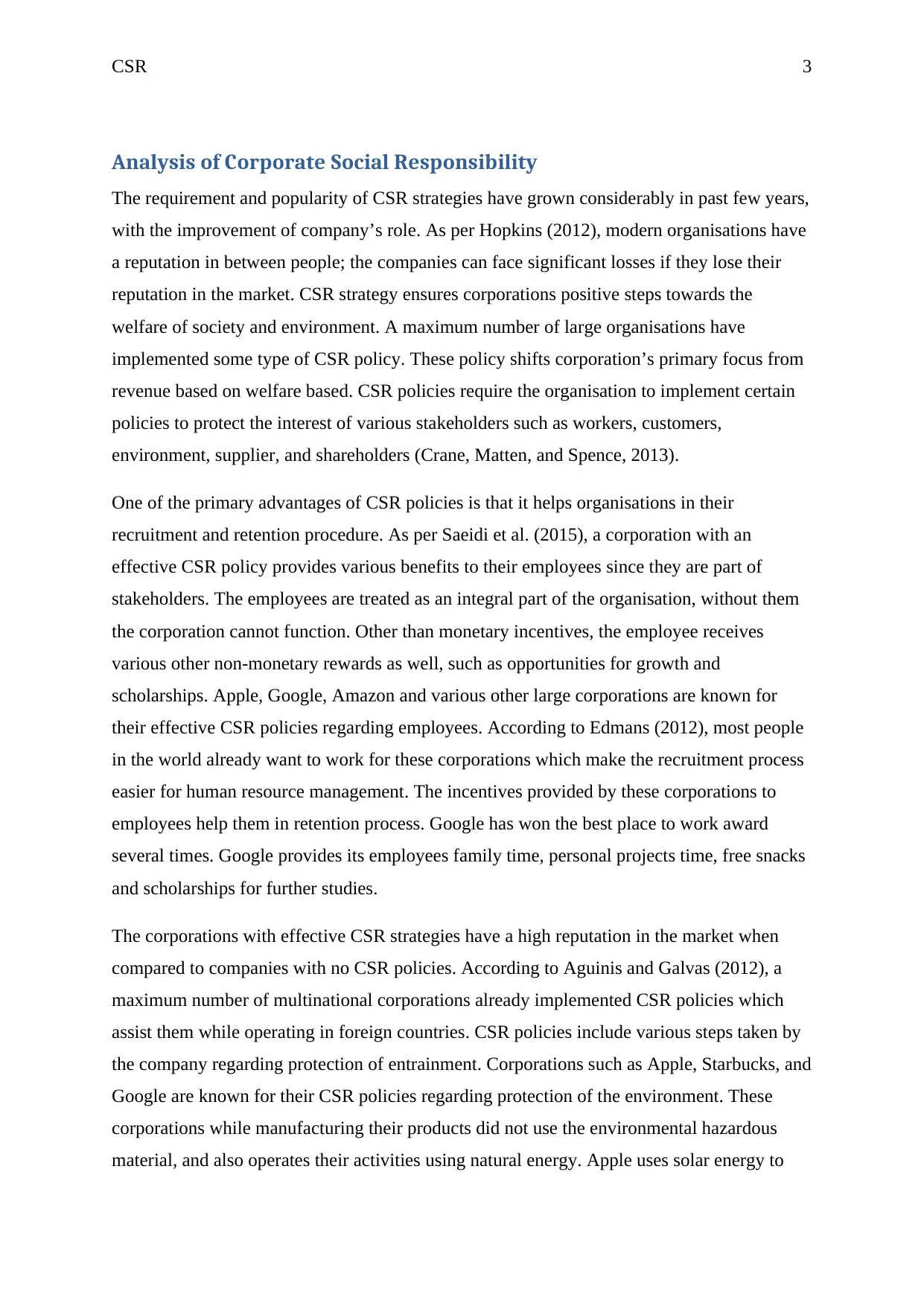
CSR 3
Analysis of Corporate Social Responsibility
The requirement and popularity of CSR strategies have grown considerably in past few years,
with the improvement of company’s role. As per Hopkins (2012), modern organisations have
a reputation in between people; the companies can face significant losses if they lose their
reputation in the market. CSR strategy ensures corporations positive steps towards the
welfare of society and environment. A maximum number of large organisations have
implemented some type of CSR policy. These policy shifts corporation’s primary focus from
revenue based on welfare based. CSR policies require the organisation to implement certain
policies to protect the interest of various stakeholders such as workers, customers,
environment, supplier, and shareholders (Crane, Matten, and Spence, 2013).
One of the primary advantages of CSR policies is that it helps organisations in their
recruitment and retention procedure. As per Saeidi et al. (2015), a corporation with an
effective CSR policy provides various benefits to their employees since they are part of
stakeholders. The employees are treated as an integral part of the organisation, without them
the corporation cannot function. Other than monetary incentives, the employee receives
various other non-monetary rewards as well, such as opportunities for growth and
scholarships. Apple, Google, Amazon and various other large corporations are known for
their effective CSR policies regarding employees. According to Edmans (2012), most people
in the world already want to work for these corporations which make the recruitment process
easier for human resource management. The incentives provided by these corporations to
employees help them in retention process. Google has won the best place to work award
several times. Google provides its employees family time, personal projects time, free snacks
and scholarships for further studies.
The corporations with effective CSR strategies have a high reputation in the market when
compared to companies with no CSR policies. According to Aguinis and Galvas (2012), a
maximum number of multinational corporations already implemented CSR policies which
assist them while operating in foreign countries. CSR policies include various steps taken by
the company regarding protection of entrainment. Corporations such as Apple, Starbucks, and
Google are known for their CSR policies regarding protection of the environment. These
corporations while manufacturing their products did not use the environmental hazardous
material, and also operates their activities using natural energy. Apple uses solar energy to
Analysis of Corporate Social Responsibility
The requirement and popularity of CSR strategies have grown considerably in past few years,
with the improvement of company’s role. As per Hopkins (2012), modern organisations have
a reputation in between people; the companies can face significant losses if they lose their
reputation in the market. CSR strategy ensures corporations positive steps towards the
welfare of society and environment. A maximum number of large organisations have
implemented some type of CSR policy. These policy shifts corporation’s primary focus from
revenue based on welfare based. CSR policies require the organisation to implement certain
policies to protect the interest of various stakeholders such as workers, customers,
environment, supplier, and shareholders (Crane, Matten, and Spence, 2013).
One of the primary advantages of CSR policies is that it helps organisations in their
recruitment and retention procedure. As per Saeidi et al. (2015), a corporation with an
effective CSR policy provides various benefits to their employees since they are part of
stakeholders. The employees are treated as an integral part of the organisation, without them
the corporation cannot function. Other than monetary incentives, the employee receives
various other non-monetary rewards as well, such as opportunities for growth and
scholarships. Apple, Google, Amazon and various other large corporations are known for
their effective CSR policies regarding employees. According to Edmans (2012), most people
in the world already want to work for these corporations which make the recruitment process
easier for human resource management. The incentives provided by these corporations to
employees help them in retention process. Google has won the best place to work award
several times. Google provides its employees family time, personal projects time, free snacks
and scholarships for further studies.
The corporations with effective CSR strategies have a high reputation in the market when
compared to companies with no CSR policies. According to Aguinis and Galvas (2012), a
maximum number of multinational corporations already implemented CSR policies which
assist them while operating in foreign countries. CSR policies include various steps taken by
the company regarding protection of entrainment. Corporations such as Apple, Starbucks, and
Google are known for their CSR policies regarding protection of the environment. These
corporations while manufacturing their products did not use the environmental hazardous
material, and also operates their activities using natural energy. Apple uses solar energy to
Paraphrase This Document
Need a fresh take? Get an instant paraphrase of this document with our AI Paraphraser
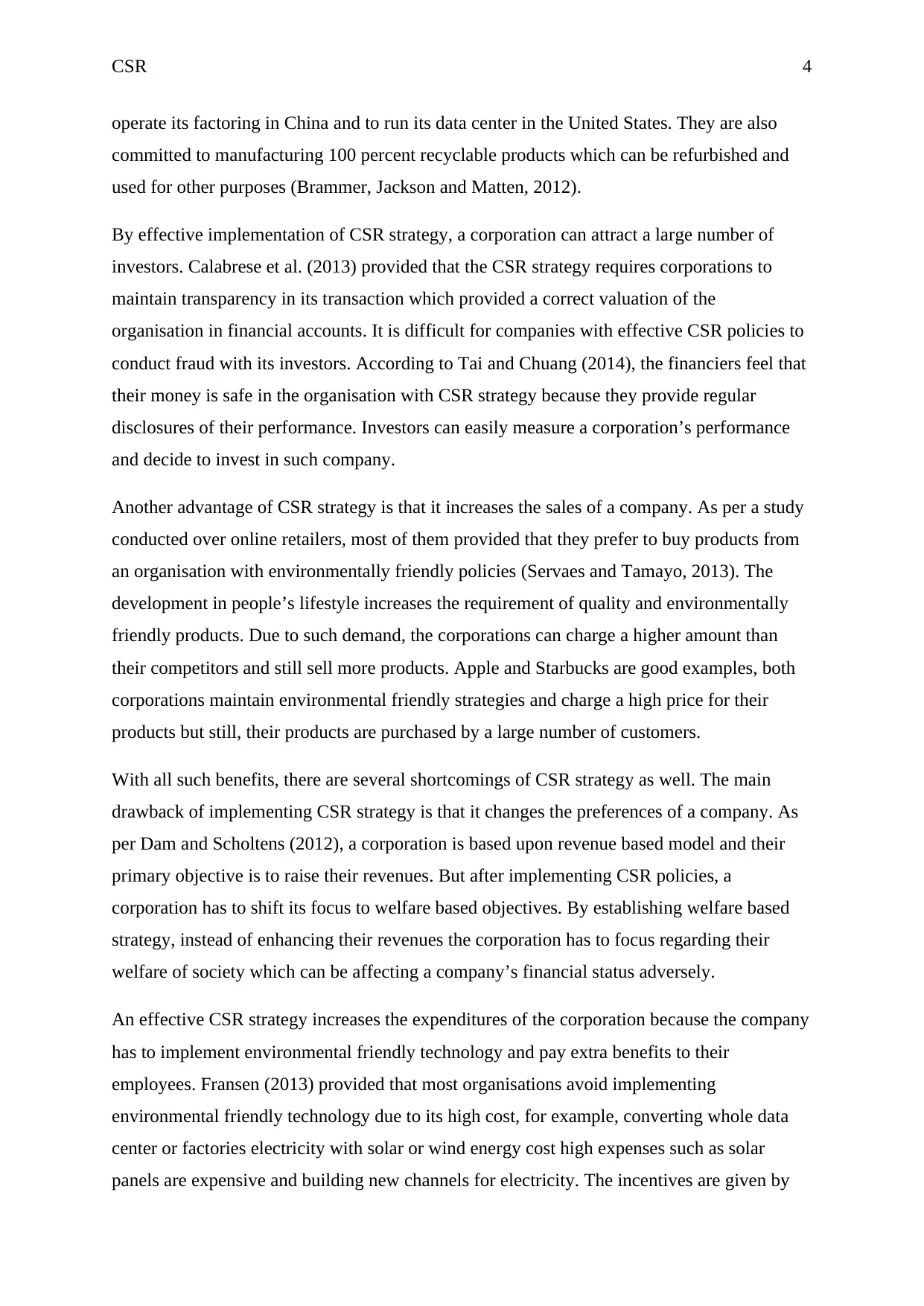
CSR 4
operate its factoring in China and to run its data center in the United States. They are also
committed to manufacturing 100 percent recyclable products which can be refurbished and
used for other purposes (Brammer, Jackson and Matten, 2012).
By effective implementation of CSR strategy, a corporation can attract a large number of
investors. Calabrese et al. (2013) provided that the CSR strategy requires corporations to
maintain transparency in its transaction which provided a correct valuation of the
organisation in financial accounts. It is difficult for companies with effective CSR policies to
conduct fraud with its investors. According to Tai and Chuang (2014), the financiers feel that
their money is safe in the organisation with CSR strategy because they provide regular
disclosures of their performance. Investors can easily measure a corporation’s performance
and decide to invest in such company.
Another advantage of CSR strategy is that it increases the sales of a company. As per a study
conducted over online retailers, most of them provided that they prefer to buy products from
an organisation with environmentally friendly policies (Servaes and Tamayo, 2013). The
development in people’s lifestyle increases the requirement of quality and environmentally
friendly products. Due to such demand, the corporations can charge a higher amount than
their competitors and still sell more products. Apple and Starbucks are good examples, both
corporations maintain environmental friendly strategies and charge a high price for their
products but still, their products are purchased by a large number of customers.
With all such benefits, there are several shortcomings of CSR strategy as well. The main
drawback of implementing CSR strategy is that it changes the preferences of a company. As
per Dam and Scholtens (2012), a corporation is based upon revenue based model and their
primary objective is to raise their revenues. But after implementing CSR policies, a
corporation has to shift its focus to welfare based objectives. By establishing welfare based
strategy, instead of enhancing their revenues the corporation has to focus regarding their
welfare of society which can be affecting a company’s financial status adversely.
An effective CSR strategy increases the expenditures of the corporation because the company
has to implement environmental friendly technology and pay extra benefits to their
employees. Fransen (2013) provided that most organisations avoid implementing
environmental friendly technology due to its high cost, for example, converting whole data
center or factories electricity with solar or wind energy cost high expenses such as solar
panels are expensive and building new channels for electricity. The incentives are given by
operate its factoring in China and to run its data center in the United States. They are also
committed to manufacturing 100 percent recyclable products which can be refurbished and
used for other purposes (Brammer, Jackson and Matten, 2012).
By effective implementation of CSR strategy, a corporation can attract a large number of
investors. Calabrese et al. (2013) provided that the CSR strategy requires corporations to
maintain transparency in its transaction which provided a correct valuation of the
organisation in financial accounts. It is difficult for companies with effective CSR policies to
conduct fraud with its investors. According to Tai and Chuang (2014), the financiers feel that
their money is safe in the organisation with CSR strategy because they provide regular
disclosures of their performance. Investors can easily measure a corporation’s performance
and decide to invest in such company.
Another advantage of CSR strategy is that it increases the sales of a company. As per a study
conducted over online retailers, most of them provided that they prefer to buy products from
an organisation with environmentally friendly policies (Servaes and Tamayo, 2013). The
development in people’s lifestyle increases the requirement of quality and environmentally
friendly products. Due to such demand, the corporations can charge a higher amount than
their competitors and still sell more products. Apple and Starbucks are good examples, both
corporations maintain environmental friendly strategies and charge a high price for their
products but still, their products are purchased by a large number of customers.
With all such benefits, there are several shortcomings of CSR strategy as well. The main
drawback of implementing CSR strategy is that it changes the preferences of a company. As
per Dam and Scholtens (2012), a corporation is based upon revenue based model and their
primary objective is to raise their revenues. But after implementing CSR policies, a
corporation has to shift its focus to welfare based objectives. By establishing welfare based
strategy, instead of enhancing their revenues the corporation has to focus regarding their
welfare of society which can be affecting a company’s financial status adversely.
An effective CSR strategy increases the expenditures of the corporation because the company
has to implement environmental friendly technology and pay extra benefits to their
employees. Fransen (2013) provided that most organisations avoid implementing
environmental friendly technology due to its high cost, for example, converting whole data
center or factories electricity with solar or wind energy cost high expenses such as solar
panels are expensive and building new channels for electricity. The incentives are given by
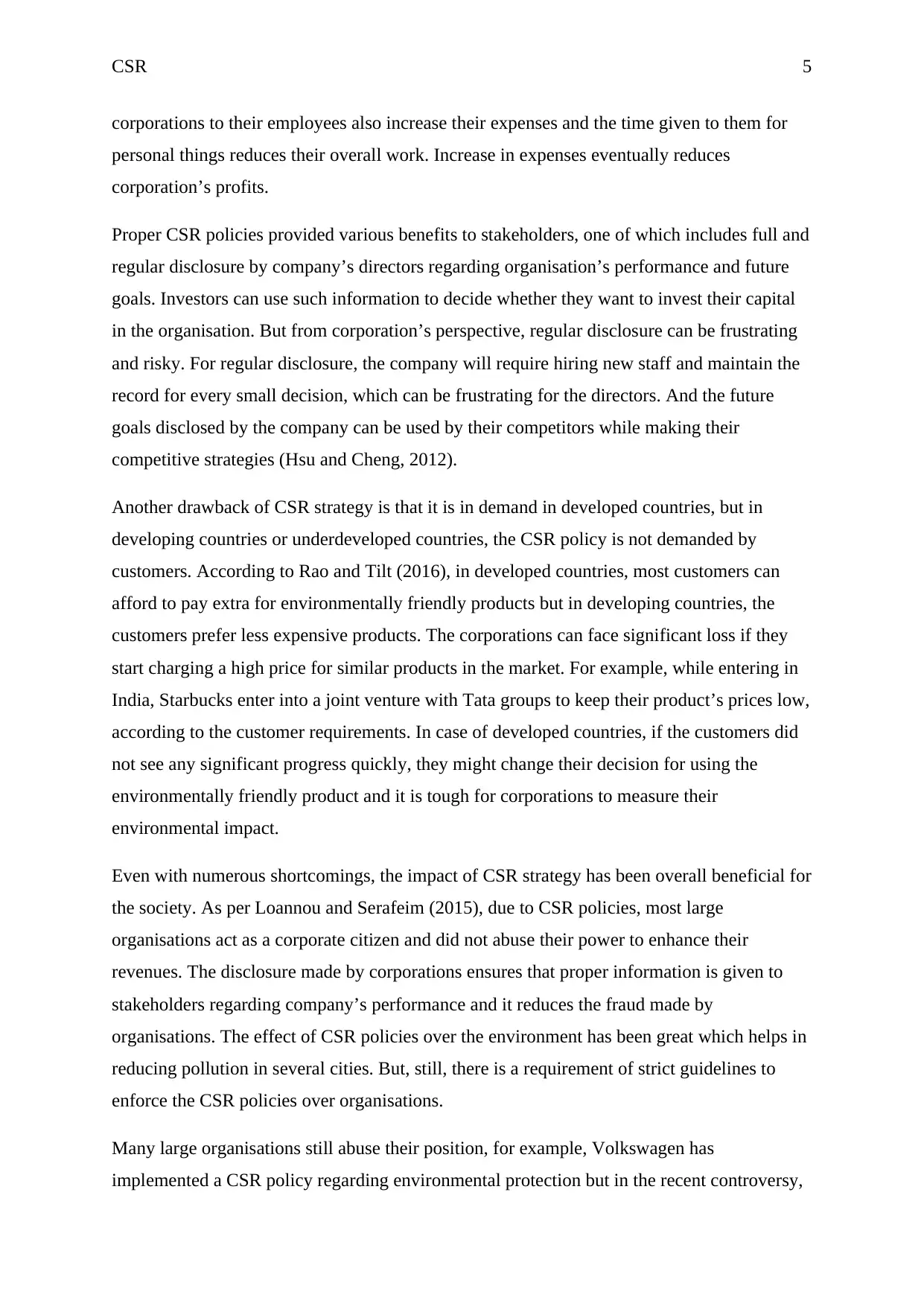
CSR 5
corporations to their employees also increase their expenses and the time given to them for
personal things reduces their overall work. Increase in expenses eventually reduces
corporation’s profits.
Proper CSR policies provided various benefits to stakeholders, one of which includes full and
regular disclosure by company’s directors regarding organisation’s performance and future
goals. Investors can use such information to decide whether they want to invest their capital
in the organisation. But from corporation’s perspective, regular disclosure can be frustrating
and risky. For regular disclosure, the company will require hiring new staff and maintain the
record for every small decision, which can be frustrating for the directors. And the future
goals disclosed by the company can be used by their competitors while making their
competitive strategies (Hsu and Cheng, 2012).
Another drawback of CSR strategy is that it is in demand in developed countries, but in
developing countries or underdeveloped countries, the CSR policy is not demanded by
customers. According to Rao and Tilt (2016), in developed countries, most customers can
afford to pay extra for environmentally friendly products but in developing countries, the
customers prefer less expensive products. The corporations can face significant loss if they
start charging a high price for similar products in the market. For example, while entering in
India, Starbucks enter into a joint venture with Tata groups to keep their product’s prices low,
according to the customer requirements. In case of developed countries, if the customers did
not see any significant progress quickly, they might change their decision for using the
environmentally friendly product and it is tough for corporations to measure their
environmental impact.
Even with numerous shortcomings, the impact of CSR strategy has been overall beneficial for
the society. As per Loannou and Serafeim (2015), due to CSR policies, most large
organisations act as a corporate citizen and did not abuse their power to enhance their
revenues. The disclosure made by corporations ensures that proper information is given to
stakeholders regarding company’s performance and it reduces the fraud made by
organisations. The effect of CSR policies over the environment has been great which helps in
reducing pollution in several cities. But, still, there is a requirement of strict guidelines to
enforce the CSR policies over organisations.
Many large organisations still abuse their position, for example, Volkswagen has
implemented a CSR policy regarding environmental protection but in the recent controversy,
corporations to their employees also increase their expenses and the time given to them for
personal things reduces their overall work. Increase in expenses eventually reduces
corporation’s profits.
Proper CSR policies provided various benefits to stakeholders, one of which includes full and
regular disclosure by company’s directors regarding organisation’s performance and future
goals. Investors can use such information to decide whether they want to invest their capital
in the organisation. But from corporation’s perspective, regular disclosure can be frustrating
and risky. For regular disclosure, the company will require hiring new staff and maintain the
record for every small decision, which can be frustrating for the directors. And the future
goals disclosed by the company can be used by their competitors while making their
competitive strategies (Hsu and Cheng, 2012).
Another drawback of CSR strategy is that it is in demand in developed countries, but in
developing countries or underdeveloped countries, the CSR policy is not demanded by
customers. According to Rao and Tilt (2016), in developed countries, most customers can
afford to pay extra for environmentally friendly products but in developing countries, the
customers prefer less expensive products. The corporations can face significant loss if they
start charging a high price for similar products in the market. For example, while entering in
India, Starbucks enter into a joint venture with Tata groups to keep their product’s prices low,
according to the customer requirements. In case of developed countries, if the customers did
not see any significant progress quickly, they might change their decision for using the
environmentally friendly product and it is tough for corporations to measure their
environmental impact.
Even with numerous shortcomings, the impact of CSR strategy has been overall beneficial for
the society. As per Loannou and Serafeim (2015), due to CSR policies, most large
organisations act as a corporate citizen and did not abuse their power to enhance their
revenues. The disclosure made by corporations ensures that proper information is given to
stakeholders regarding company’s performance and it reduces the fraud made by
organisations. The effect of CSR policies over the environment has been great which helps in
reducing pollution in several cities. But, still, there is a requirement of strict guidelines to
enforce the CSR policies over organisations.
Many large organisations still abuse their position, for example, Volkswagen has
implemented a CSR policy regarding environmental protection but in the recent controversy,
⊘ This is a preview!⊘
Do you want full access?
Subscribe today to unlock all pages.

Trusted by 1+ million students worldwide

CSR 6
theory found guilty of using the highly polluted material in their vehicles. In 2014, the
corporations such as Starbucks and Google, which are known for implementing strict CSR
policies, has found guilty of tax evasion in the United Kingdom. Apple has been involved in a
controversy regarding their factories in China, which makes their employees work under
dangerous working environmental with a considerably low salary (Fisher, 2014). Incidents
such as this show the requirement of strict implementation of CSR policy by the government
for the benefit of society and environment.
theory found guilty of using the highly polluted material in their vehicles. In 2014, the
corporations such as Starbucks and Google, which are known for implementing strict CSR
policies, has found guilty of tax evasion in the United Kingdom. Apple has been involved in a
controversy regarding their factories in China, which makes their employees work under
dangerous working environmental with a considerably low salary (Fisher, 2014). Incidents
such as this show the requirement of strict implementation of CSR policy by the government
for the benefit of society and environment.
Paraphrase This Document
Need a fresh take? Get an instant paraphrase of this document with our AI Paraphraser
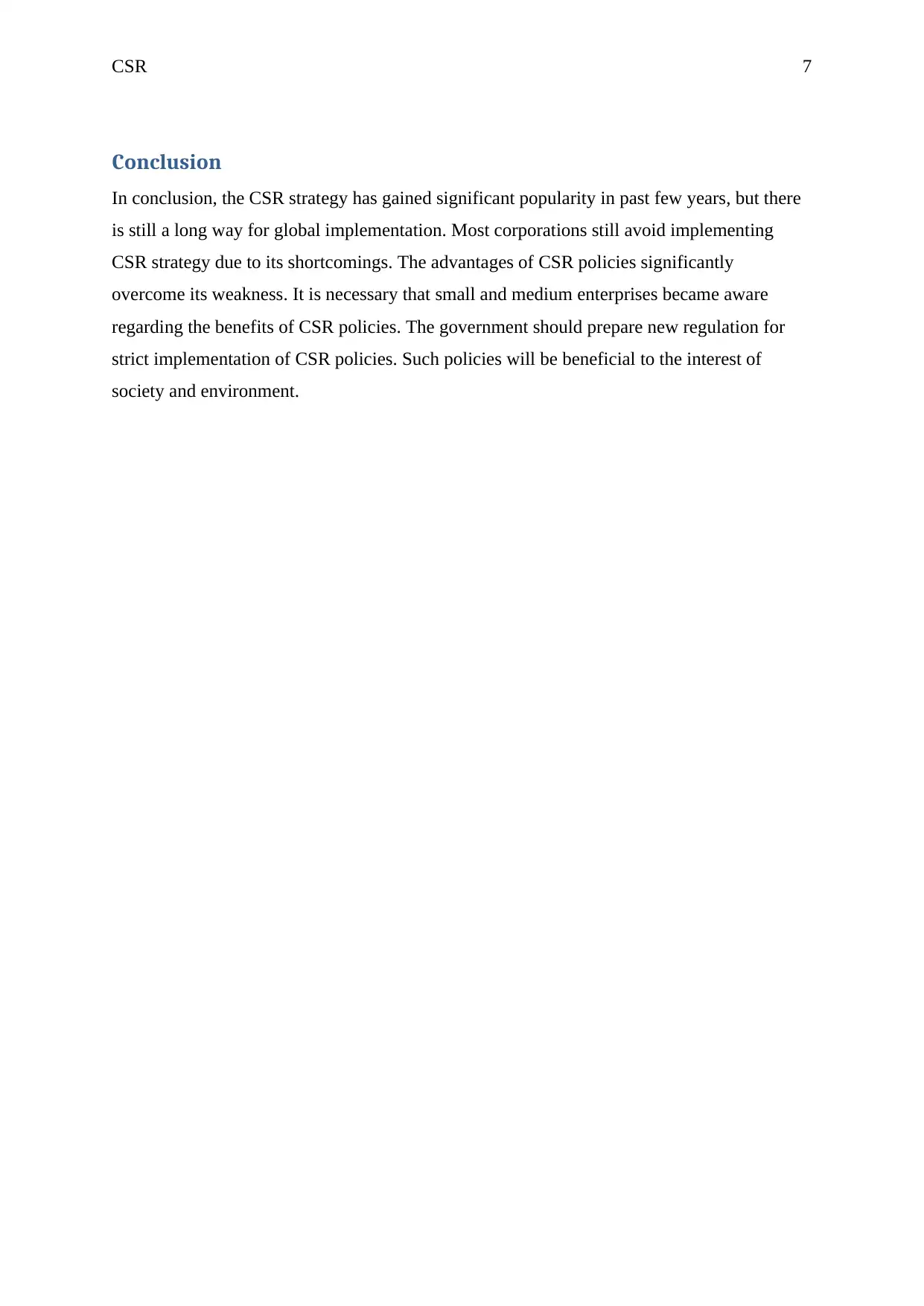
CSR 7
Conclusion
In conclusion, the CSR strategy has gained significant popularity in past few years, but there
is still a long way for global implementation. Most corporations still avoid implementing
CSR strategy due to its shortcomings. The advantages of CSR policies significantly
overcome its weakness. It is necessary that small and medium enterprises became aware
regarding the benefits of CSR policies. The government should prepare new regulation for
strict implementation of CSR policies. Such policies will be beneficial to the interest of
society and environment.
Conclusion
In conclusion, the CSR strategy has gained significant popularity in past few years, but there
is still a long way for global implementation. Most corporations still avoid implementing
CSR strategy due to its shortcomings. The advantages of CSR policies significantly
overcome its weakness. It is necessary that small and medium enterprises became aware
regarding the benefits of CSR policies. The government should prepare new regulation for
strict implementation of CSR policies. Such policies will be beneficial to the interest of
society and environment.
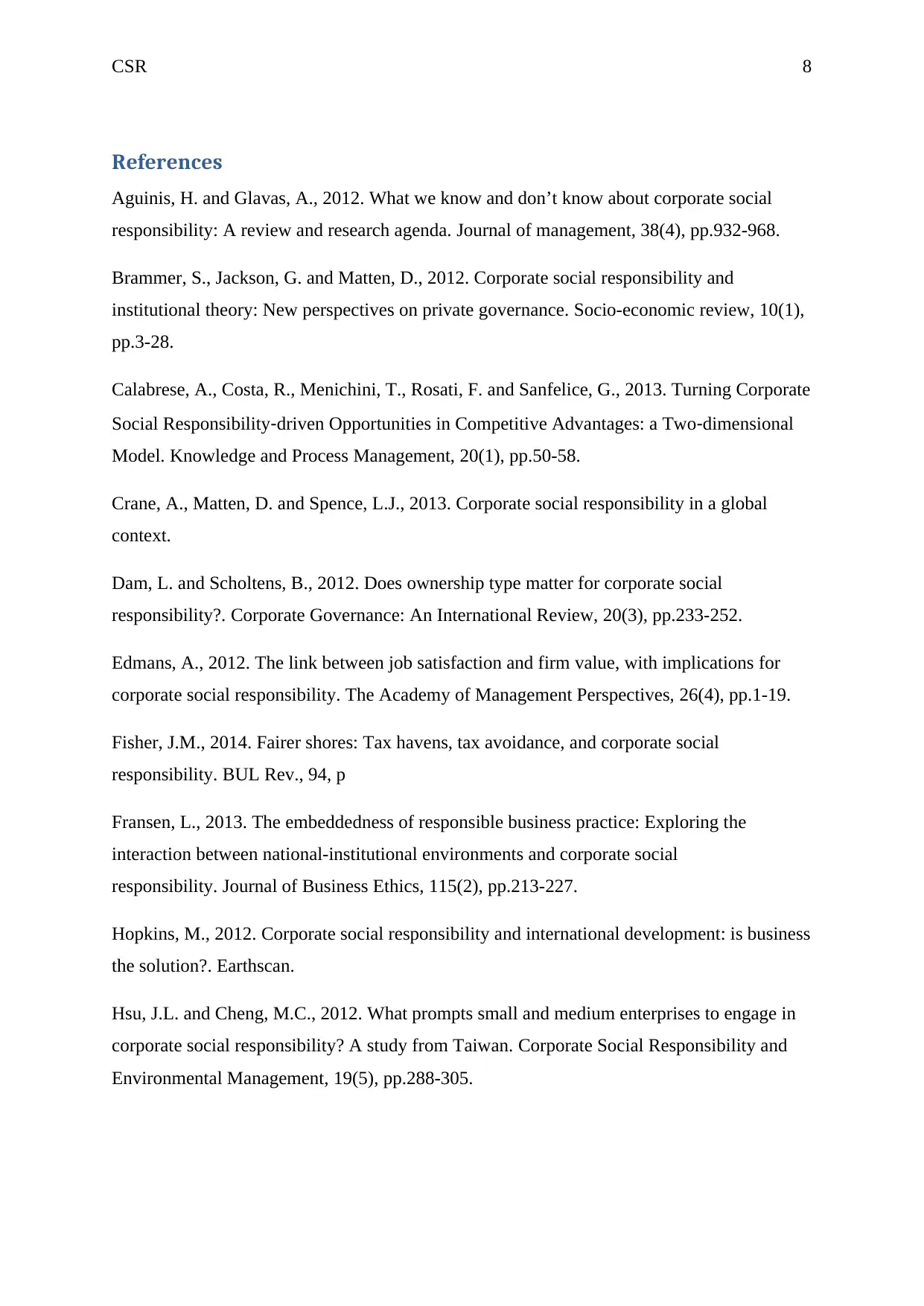
CSR 8
References
Aguinis, H. and Glavas, A., 2012. What we know and don’t know about corporate social
responsibility: A review and research agenda. Journal of management, 38(4), pp.932-968.
Brammer, S., Jackson, G. and Matten, D., 2012. Corporate social responsibility and
institutional theory: New perspectives on private governance. Socio-economic review, 10(1),
pp.3-28.
Calabrese, A., Costa, R., Menichini, T., Rosati, F. and Sanfelice, G., 2013. Turning Corporate
Social Responsibility‐driven Opportunities in Competitive Advantages: a Two‐dimensional
Model. Knowledge and Process Management, 20(1), pp.50-58.
Crane, A., Matten, D. and Spence, L.J., 2013. Corporate social responsibility in a global
context.
Dam, L. and Scholtens, B., 2012. Does ownership type matter for corporate social
responsibility?. Corporate Governance: An International Review, 20(3), pp.233-252.
Edmans, A., 2012. The link between job satisfaction and firm value, with implications for
corporate social responsibility. The Academy of Management Perspectives, 26(4), pp.1-19.
Fisher, J.M., 2014. Fairer shores: Tax havens, tax avoidance, and corporate social
responsibility. BUL Rev., 94, p
Fransen, L., 2013. The embeddedness of responsible business practice: Exploring the
interaction between national-institutional environments and corporate social
responsibility. Journal of Business Ethics, 115(2), pp.213-227.
Hopkins, M., 2012. Corporate social responsibility and international development: is business
the solution?. Earthscan.
Hsu, J.L. and Cheng, M.C., 2012. What prompts small and medium enterprises to engage in
corporate social responsibility? A study from Taiwan. Corporate Social Responsibility and
Environmental Management, 19(5), pp.288-305.
References
Aguinis, H. and Glavas, A., 2012. What we know and don’t know about corporate social
responsibility: A review and research agenda. Journal of management, 38(4), pp.932-968.
Brammer, S., Jackson, G. and Matten, D., 2012. Corporate social responsibility and
institutional theory: New perspectives on private governance. Socio-economic review, 10(1),
pp.3-28.
Calabrese, A., Costa, R., Menichini, T., Rosati, F. and Sanfelice, G., 2013. Turning Corporate
Social Responsibility‐driven Opportunities in Competitive Advantages: a Two‐dimensional
Model. Knowledge and Process Management, 20(1), pp.50-58.
Crane, A., Matten, D. and Spence, L.J., 2013. Corporate social responsibility in a global
context.
Dam, L. and Scholtens, B., 2012. Does ownership type matter for corporate social
responsibility?. Corporate Governance: An International Review, 20(3), pp.233-252.
Edmans, A., 2012. The link between job satisfaction and firm value, with implications for
corporate social responsibility. The Academy of Management Perspectives, 26(4), pp.1-19.
Fisher, J.M., 2014. Fairer shores: Tax havens, tax avoidance, and corporate social
responsibility. BUL Rev., 94, p
Fransen, L., 2013. The embeddedness of responsible business practice: Exploring the
interaction between national-institutional environments and corporate social
responsibility. Journal of Business Ethics, 115(2), pp.213-227.
Hopkins, M., 2012. Corporate social responsibility and international development: is business
the solution?. Earthscan.
Hsu, J.L. and Cheng, M.C., 2012. What prompts small and medium enterprises to engage in
corporate social responsibility? A study from Taiwan. Corporate Social Responsibility and
Environmental Management, 19(5), pp.288-305.
⊘ This is a preview!⊘
Do you want full access?
Subscribe today to unlock all pages.

Trusted by 1+ million students worldwide
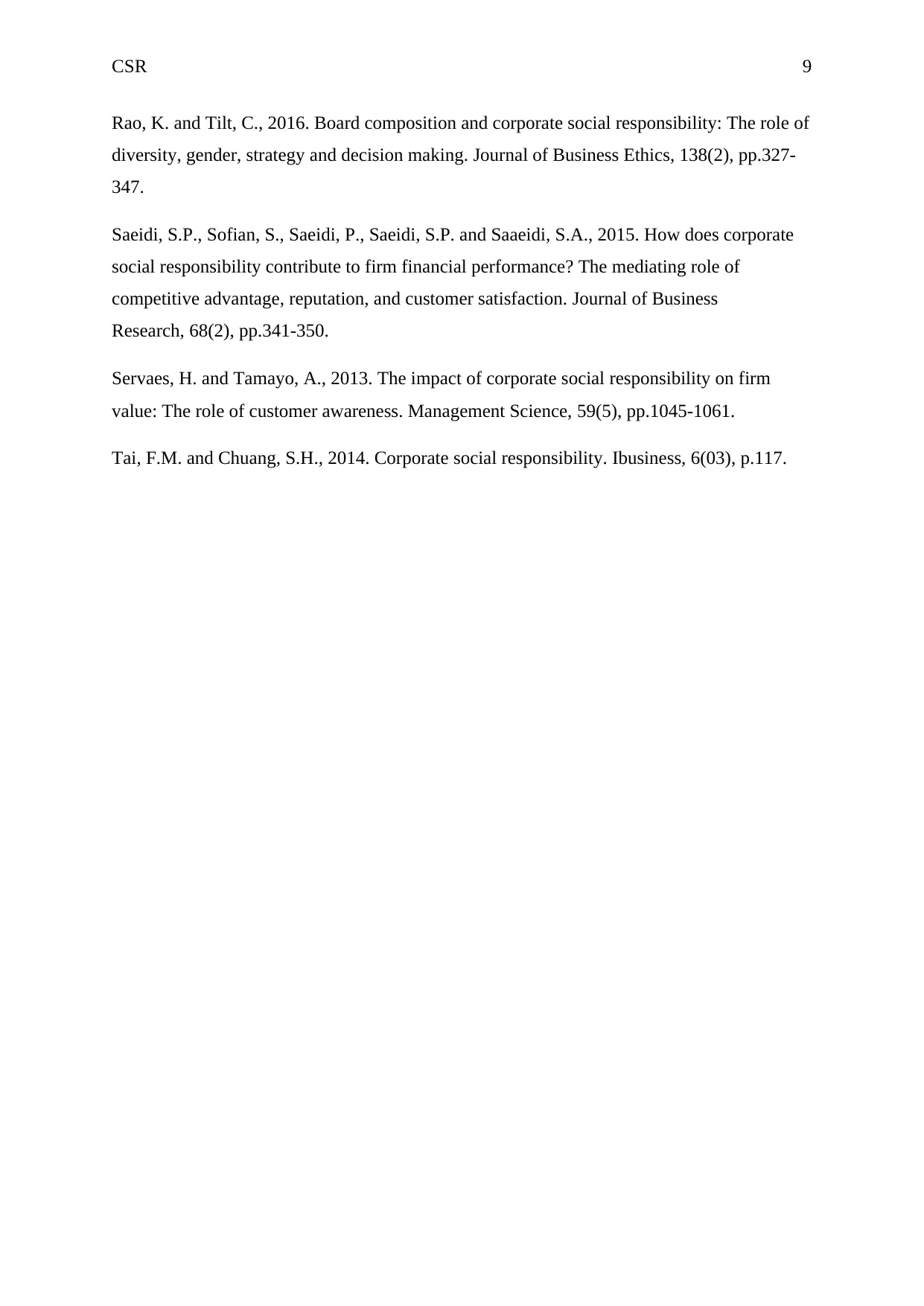
CSR 9
Rao, K. and Tilt, C., 2016. Board composition and corporate social responsibility: The role of
diversity, gender, strategy and decision making. Journal of Business Ethics, 138(2), pp.327-
347.
Saeidi, S.P., Sofian, S., Saeidi, P., Saeidi, S.P. and Saaeidi, S.A., 2015. How does corporate
social responsibility contribute to firm financial performance? The mediating role of
competitive advantage, reputation, and customer satisfaction. Journal of Business
Research, 68(2), pp.341-350.
Servaes, H. and Tamayo, A., 2013. The impact of corporate social responsibility on firm
value: The role of customer awareness. Management Science, 59(5), pp.1045-1061.
Tai, F.M. and Chuang, S.H., 2014. Corporate social responsibility. Ibusiness, 6(03), p.117.
Rao, K. and Tilt, C., 2016. Board composition and corporate social responsibility: The role of
diversity, gender, strategy and decision making. Journal of Business Ethics, 138(2), pp.327-
347.
Saeidi, S.P., Sofian, S., Saeidi, P., Saeidi, S.P. and Saaeidi, S.A., 2015. How does corporate
social responsibility contribute to firm financial performance? The mediating role of
competitive advantage, reputation, and customer satisfaction. Journal of Business
Research, 68(2), pp.341-350.
Servaes, H. and Tamayo, A., 2013. The impact of corporate social responsibility on firm
value: The role of customer awareness. Management Science, 59(5), pp.1045-1061.
Tai, F.M. and Chuang, S.H., 2014. Corporate social responsibility. Ibusiness, 6(03), p.117.
1 out of 10
Related Documents
Your All-in-One AI-Powered Toolkit for Academic Success.
+13062052269
info@desklib.com
Available 24*7 on WhatsApp / Email
![[object Object]](/_next/static/media/star-bottom.7253800d.svg)
Unlock your academic potential
Copyright © 2020–2026 A2Z Services. All Rights Reserved. Developed and managed by ZUCOL.





